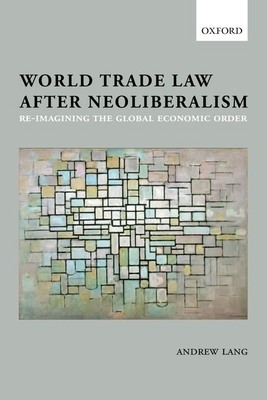It is often argued that there is an inherent tension between international human rights law and the rules of free trade. This book explores the assumptions underlying this debate and argues that we need to reconsider them, focusing more on how expert knowledge and informal relationships shape trade law and its interaction with human rights.
The rise of economic liberalism in the latter stages of the 20th century coincided with a fundamental transformation of international economic governance, especially through the law of the World Trade Organization. In this book, Andrew Lang provides a new account of this transformation, and considers its enduring implications for international law. Against the commonly-held idea that ''neoliberal'' policy prescriptions were encoded into WTO law, Lang argues that the last decades of the 20th century saw a reinvention of the international trade regime, and a reconstitution of its internal structures of knowledge.In addition, the book explores the way that resistance to economic liberalism was expressed and articulated over the same period in other areas of international law, most prominently international human rights law. It considers the promise and limitations of this form of ''inter-regime'' contestation, arguing that measures to ensure greater collaboration and cooperation between regimes may fail in their objectives if they are not accompanied by a simultaneous destabilization of each regime''s structures of knowledge and characteristic features. With that in mind, the book contributes to a full and productive contestation of the nature and purpose of global economic governance.
Get World Trade Law after Neoliberalism by at the best price and quality guranteed only at Werezi Africa largest book ecommerce store. The book was published by Oxford University Press and it has pages. Enjoy Shopping Best Offers & Deals on books Online from Werezi - Receive at your doorstep - Fast Delivery - Secure mode of Payment
 Jacket, Women
Jacket, Women
 Woolend Jacket
Woolend Jacket
 Western denim
Western denim
 Mini Dresss
Mini Dresss
 Jacket, Women
Jacket, Women
 Woolend Jacket
Woolend Jacket
 Western denim
Western denim
 Mini Dresss
Mini Dresss
 Jacket, Women
Jacket, Women
 Woolend Jacket
Woolend Jacket
 Western denim
Western denim
 Mini Dresss
Mini Dresss
 Jacket, Women
Jacket, Women
 Woolend Jacket
Woolend Jacket
 Western denim
Western denim
 Mini Dresss
Mini Dresss
 Jacket, Women
Jacket, Women
 Woolend Jacket
Woolend Jacket
 Western denim
Western denim
 Mini Dresss
Mini Dresss






























































